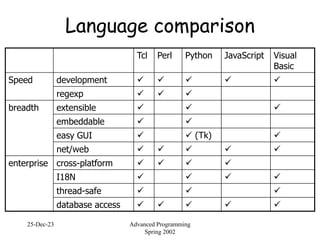python.ppt python python python python python
- 1. 25-Dec-23 Advanced Programming Spring 2002 Python Henning Schulzrinne Department of Computer Science Columbia University (based on tutorial by Guido van Rossum)
- 2. 25-Dec-23 Advanced Programming Spring 2002 Introduction Most recent popular (scripting/extension) language although origin ~1991 heritage: teaching language (ABC) Tcl: shell perl: string (regex) processing object-oriented rather than add-on (OOTcl)
- 3. 25-Dec-23 Advanced Programming Spring 2002 Python philosophy Coherence not hard to read, write and maintain power scope rapid development + large systems objects integration hybrid systems
- 4. 25-Dec-23 Advanced Programming Spring 2002 Python features no compiling or linking rapid development cycle no type declarations simpler, shorter, more flexible automatic memory management garbage collection high-level data types and operations fast development object-oriented programming code structuring and reuse, C++ embedding and extending in C mixed language systems classes, modules, exceptions "programming-in-the-large" support dynamic loading of C modules simplified extensions, smaller binaries dynamic reloading of C modules programs can be modified without stopping Lutz, Programming Python
- 5. 25-Dec-23 Advanced Programming Spring 2002 Python features universal "first-class" object model fewer restrictions and rules run-time program construction handles unforeseen needs, end- user coding interactive, dynamic nature incremental development and testing access to interpreter information metaprogramming, introspective objects wide portability cross-platform programming without ports compilation to portable byte-code execution speed, protecting source code built-in interfaces to external services system tools, GUIs, persistence, databases, etc. Lutz, Programming Python
- 6. 25-Dec-23 Advanced Programming Spring 2002 Python elements from C++, Modula-3 (modules), ABC, Icon (slicing) same family as Perl, Tcl, Scheme, REXX, BASIC dialects
- 7. 25-Dec-23 Advanced Programming Spring 2002 Uses of Python shell tools system admin tools, command line programs extension-language work rapid prototyping and development language-based modules instead of special-purpose parsers graphical user interfaces database access distributed programming Internet scripting
- 8. 25-Dec-23 Advanced Programming Spring 2002 What not to use Python (and kin) for most scripting languages share these not as efficient as C but sometimes better built-in algorithms (e.g., hashing and sorting) delayed error notification lack of profiling tools
- 9. 25-Dec-23 Advanced Programming Spring 2002 Using python /usr/local/bin/python #! /usr/bin/env python interactive use Python 1.6 (#1, Sep 24 2000, 20:40:45) [GCC 2.95.1 19990816 (release)] on sunos5 Copyright (c) 1995-2000 Corporation for National Research Initiatives. All Rights Reserved. Copyright (c) 1991-1995 Stichting Mathematisch Centrum, Amsterdam. All Rights Reserved. >>> python –c command [arg] ... python –i script read script first, then interactive
- 10. 25-Dec-23 Advanced Programming Spring 2002 Python structure modules: Python source files or C extensions import, top-level via from, reload statements control flow create objects indentation matters – instead of {} objects everything is an object automatically reclaimed when no longer needed
- 11. 25-Dec-23 Advanced Programming Spring 2002 First example #!/usr/local/bin/python # import systems module import sys marker = '::::::' for name in sys.argv[1:]: input = open(name, 'r') print marker + name print input.read()
- 12. 25-Dec-23 Advanced Programming Spring 2002 Basic operations Assignment: size = 40 a = b = c = 3 Numbers integer, float complex numbers: 1j+3, abs(z) Strings 'hello world', 'it's hot' "bye world" continuation via or use """ long text """"
- 13. 25-Dec-23 Advanced Programming Spring 2002 String operations concatenate with + or neighbors word = 'Help' + x word = 'Help' 'a' subscripting of strings 'Hello'[2] 'l' slice: 'Hello'[1:2] 'el' word[-1] last character len(word) 5 immutable: cannot assign to subscript
- 14. 25-Dec-23 Advanced Programming Spring 2002 Lists lists can be heterogeneous a = ['spam', 'eggs', 100, 1234, 2*2] Lists can be indexed and sliced: a[0] spam a[:2] ['spam', 'eggs'] Lists can be manipulated a[2] = a[2] + 23 a[0:2] = [1,12] a[0:0] = [] len(a) 5
- 15. 25-Dec-23 Advanced Programming Spring 2002 Basic programming a,b = 0, 1 # non-zero = true while b < 10: # formatted output, without n print b, # multiple assignment a,b = b, a+b
- 16. 25-Dec-23 Advanced Programming Spring 2002 Control flow: if x = int(raw_input("Please enter #:")) if x < 0: x = 0 print 'Negative changed to zero' elif x == 0: print 'Zero' elif x == 1: print 'Single' else: print 'More' no case statement
- 17. 25-Dec-23 Advanced Programming Spring 2002 Control flow: for a = ['cat', 'window', 'defenestrate'] for x in a: print x, len(x) no arithmetic progression, but range(10) [0, 1, 2, 3, 4, 5, 6, 7, 8, 9] for i in range(len(a)): print i, a[i] do not modify the sequence being iterated over
- 18. 25-Dec-23 Advanced Programming Spring 2002 Loops: break, continue, else break and continue like C else after loop exhaustion for n in range(2,10): for x in range(2,n): if n % x == 0: print n, 'equals', x, '*', n/x break else: # loop fell through without finding a factor print n, 'is prime'
- 19. 25-Dec-23 Advanced Programming Spring 2002 Do nothing pass does nothing syntactic filler while 1: pass
- 20. 25-Dec-23 Advanced Programming Spring 2002 Defining functions def fib(n): """Print a Fibonacci series up to n.""" a, b = 0, 1 while b < n: print b, a, b = b, a+b >>> fib(2000) First line is docstring first look for variables in local, then global need global to assign global variables
- 21. 25-Dec-23 Advanced Programming Spring 2002 Functions: default argument values def ask_ok(prompt, retries=4, complaint='Yes or no, please!'): while 1: ok = raw_input(prompt) if ok in ('y', 'ye', 'yes'): return 1 if ok in ('n', 'no'): return 0 retries = retries - 1 if retries < 0: raise IOError, 'refusenik error' print complaint >>> ask_ok('Really?')
- 22. 25-Dec-23 Advanced Programming Spring 2002 Keyword arguments last arguments can be given as keywords def parrot(voltage, state='a stiff', action='voom', type='Norwegian blue'): print "-- This parrot wouldn't", action, print "if you put", voltage, "Volts through it." print "Lovely plumage, the ", type print "-- It's", state, "!" parrot(1000) parrot(action='VOOOM', voltage=100000)
- 23. 25-Dec-23 Advanced Programming Spring 2002 Lambda forms anonymous functions may not work in older versions def make_incrementor(n): return lambda x: x + n f = make_incrementor(42) f(0) f(1)
- 24. 25-Dec-23 Advanced Programming Spring 2002 List methods append(x) extend(L) append all items in list (like Tcl lappend) insert(i,x) remove(x) pop([i]), pop() create stack (FIFO), or queue (LIFO) pop(0) index(x) return the index for value x
- 25. 25-Dec-23 Advanced Programming Spring 2002 List methods count(x) how many times x appears in list sort() sort items in place reverse() reverse list
- 26. 25-Dec-23 Advanced Programming Spring 2002 Functional programming tools filter(function, sequence) def f(x): return x%2 != 0 and x%3 0 filter(f, range(2,25)) map(function, sequence) call function for each item return list of return values reduce(function, sequence) return a single value call binary function on the first two items then on the result and next item iterate
- 27. 25-Dec-23 Advanced Programming Spring 2002 List comprehensions (2.0) Create lists without map(), filter(), lambda = expression followed by for clause + zero or more for or of clauses >>> vec = [2,4,6] >>> [3*x for x in vec] [6, 12, 18] >>> [{x: x**2} for x in vec} [{2: 4}, {4: 16}, {6: 36}]
- 28. 25-Dec-23 Advanced Programming Spring 2002 List comprehensions cross products: >>> vec1 = [2,4,6] >>> vec2 = [4,3,-9] >>> [x*y for x in vec1 for y in vec2] [8,6,-18, 16,12,-36, 24,18,-54] >>> [x+y for x in vec1 and y in vec2] [6,5,-7,8,7,-5,10,9,-3] >>> [vec1[i]*vec2[i] for i in range(len(vec1))] [8,12,-54]
- 29. 25-Dec-23 Advanced Programming Spring 2002 List comprehensions can also use if: >>> [3*x for x in vec if x > 3] [12, 18] >>> [3*x for x in vec if x < 2] []
- 30. 25-Dec-23 Advanced Programming Spring 2002 del – removing list items remove by index, not value remove slices from list (rather than by assigning an empty list) >>> a = [-1,1,66.6,333,333,1234.5] >>> del a[0] >>> a [1,66.6,333,333,1234.5] >>> del a[2:4] >>> a [1,66.6,1234.5]
- 31. 25-Dec-23 Advanced Programming Spring 2002 Tuples and sequences lists, strings, tuples: examples of sequence type tuple = values separated by commas >>> t = 123, 543, 'bar' >>> t[0] 123 >>> t (123, 543, 'bar')
- 32. 25-Dec-23 Advanced Programming Spring 2002 Tuples Tuples may be nested >>> u = t, (1,2) >>> u ((123, 542, 'bar'), (1,2)) kind of like structs, but no element names: (x,y) coordinates database records like strings, immutable can't assign to individual items
- 33. 25-Dec-23 Advanced Programming Spring 2002 Tuples Empty tuples: () >>> empty = () >>> len(empty) 0 one item trailing comma >>> singleton = 'foo',
- 34. 25-Dec-23 Advanced Programming Spring 2002 Tuples sequence unpacking distribute elements across variables >>> t = 123, 543, 'bar' >>> x, y, z = t >>> x 123 packing always creates tuple unpacking works for any sequence
- 35. 25-Dec-23 Advanced Programming Spring 2002 Dictionaries like Tcl or awk associative arrays indexed by keys keys are any immutable type: e.g., tuples but not lists (mutable!) uses 'key: value' notation >>> tel = {'hgs' : 7042, 'lennox': 7018} >>> tel['cs'] = 7000 >>> tel
- 36. 25-Dec-23 Advanced Programming Spring 2002 Dictionaries no particular order delete elements with del >>> del tel['foo'] keys() method unsorted list of keys >>> tel.keys() ['cs', 'lennox', 'hgs'] use has_key() to check for existence >>> tel.has_key('foo') 0
- 37. 25-Dec-23 Advanced Programming Spring 2002 Conditions can check for sequence membership with is and is not: >>> if (4 in vec): ... print '4 is' chained comparisons: a less than b AND b equals c: a < b == c and and or are short-circuit operators: evaluated from left to right stop evaluation as soon as outcome clear
- 38. 25-Dec-23 Advanced Programming Spring 2002 Conditions Can assign comparison to variable: >>> s1,s2,s3='', 'foo', 'bar' >>> non_null = s1 or s2 or s3 >>> non_null foo Unlike C, no assignment within expression
- 39. 25-Dec-23 Advanced Programming Spring 2002 Comparing sequences unlike C, can compare sequences (lists, tuples, ...) lexicographical comparison: compare first; if different outcome continue recursively subsequences are smaller strings use ASCII comparison can compare objects of different type, but by type name (list < string < tuple)
- 40. 25-Dec-23 Advanced Programming Spring 2002 Comparing sequences (1,2,3) < (1,2,4) [1,2,3] < [1,2,4] 'ABC' < 'C' < 'Pascal' < 'Python' (1,2,3) == (1.0,2.0,3.0) (1,2) < (1,2,-1)
- 41. 25-Dec-23 Advanced Programming Spring 2002 Modules collection of functions and variables, typically in scripts definitions can be imported file name is module name + .py e.g., create module fibo.py def fib(n): # write Fib. series up to n ... def fib2(n): # return Fib. series up to n
- 42. 25-Dec-23 Advanced Programming Spring 2002 Modules import module: import fibo Use modules via "name space": >>> fibo.fib(1000) >>> fibo.__name__ 'fibo' can give it a local name: >>> fib = fibo.fib >>> fib(500)
- 43. 25-Dec-23 Advanced Programming Spring 2002 Modules function definition + executable statements executed only when module is imported modules have private symbol tables avoids name clash for global variables accessible as module.globalname can import into name space: >>> from fibo import fib, fib2 >>> fib(500) can import all names defined by module: >>> from fibo import *
- 44. 25-Dec-23 Advanced Programming Spring 2002 Module search path current directory list of directories specified in PYTHONPATH environment variable uses installation-default if not defined, e.g., .:/usr/local/lib/python uses sys.path >>> import sys >>> sys.path ['', 'C:PROGRA~1Python2.2', 'C:Program FilesPython2.2DLLs', 'C:Program FilesPython2.2lib', 'C:Program FilesPython2.2liblib-tk', 'C:Program FilesPython2.2', 'C:Program FilesPython2.2libsite- packages']
- 45. 25-Dec-23 Advanced Programming Spring 2002 Compiled Python files include byte-compiled version of module if there exists fibo.pyc in same directory as fibo.py only if creation time of fibo.pyc matches fibo.py automatically write compiled file, if possible platform independent doesn't run any faster, but loads faster can have only .pyc file hide source
- 46. 25-Dec-23 Advanced Programming Spring 2002 Standard modules system-dependent list always sys module >>> import sys >>> sys.p1 '>>> ' >>> sys.p2 '... ' >>> sys.path.append('/some/directory')
- 47. 25-Dec-23 Advanced Programming Spring 2002 Module listing use dir() for each module >>> dir(fibo) ['___name___', 'fib', 'fib2'] >>> dir(sys) ['__displayhook__', '__doc__', '__excepthook__', '__name__', '__stderr__', '__st din__', '__stdout__', '_getframe', 'argv', 'builtin_module_names', 'byteorder', 'copyright', 'displayhook', 'dllhandle', 'exc_info', 'exc_type', 'excepthook', ' exec_prefix', 'executable', 'exit', 'getdefaultencoding', 'getrecursionlimit', ' getrefcount', 'hexversion', 'last_type', 'last_value', 'maxint', 'maxunicode', ' modules', 'path', 'platform', 'prefix', 'ps1', 'ps2', 'setcheckinterval', 'setpr ofile', 'setrecursionlimit', 'settrace', 'stderr', 'stdin', 'stdout', 'version', 'version_info', 'warnoptions', 'winver']
- 48. 25-Dec-23 Advanced Programming Spring 2002 Classes mixture of C++ and Modula-3 multiple base classes derived class can override any methods of its base class(es) method can call the method of a base class with the same name objects have private data C++ terms: all class members are public all member functions are virtual no constructors or destructors (not needed)
- 49. 25-Dec-23 Advanced Programming Spring 2002 Classes classes (and data types) are objects built-in types cannot be used as base classes by user arithmetic operators, subscripting can be redefined for class instances (like C++, unlike Java)
- 50. 25-Dec-23 Advanced Programming Spring 2002 Class definitions Class ClassName: <statement-1> ... <statement-N> must be executed can be executed conditionally (see Tcl) creates new namespace
- 51. 25-Dec-23 Advanced Programming Spring 2002 Namespaces mapping from name to object: built-in names (abs()) global names in module local names in function invocation attributes = any following a dot z.real, z.imag attributes read-only or writable module attributes are writeable
- 52. 25-Dec-23 Advanced Programming Spring 2002 Namespaces scope = textual region of Python program where a namespace is directly accessible (without dot) innermost scope (first) = local names middle scope = current module's global names outermost scope (last) = built-in names assignments always affect innermost scope don't copy, just create name bindings to objects global indicates name is in global scope
- 53. 25-Dec-23 Advanced Programming Spring 2002 Class objects obj.name references (plus module!): class MyClass: "A simple example class" i = 123 def f(self): return 'hello world' >>> MyClass.i 123 MyClass.f is method object
- 54. 25-Dec-23 Advanced Programming Spring 2002 Class objects class instantiation: >>> x = MyClass() >>> x.f() 'hello world' creates new instance of class note x = MyClass vs. x = MyClass() ___init__() special method for initialization of object def __init__(self,realpart,imagpart): self.r = realpart self.i = imagpart
- 55. 25-Dec-23 Advanced Programming Spring 2002 Instance objects attribute references data attributes (C++/Java data members) created dynamically x.counter = 1 while x.counter < 10: x.counter = x.counter * 2 print x.counter del x.counter
- 56. 25-Dec-23 Advanced Programming Spring 2002 Method objects Called immediately: x.f() can be referenced: xf = x.f while 1: print xf() object is passed as first argument of function 'self' x.f() is equivalent to MyClass.f(x)
- 57. 25-Dec-23 Advanced Programming Spring 2002 Notes on classes Data attributes override method attributes with the same name no real hiding not usable to implement pure abstract data types clients (users) of an object can add data attributes first argument of method usually called self 'self' has no special meaning (cf. Java)
- 58. 25-Dec-23 Advanced Programming Spring 2002 Another example bag.py class Bag: def __init__(self): self.data = [] def add(self, x): self.data.append(x) def addtwice(self,x): self.add(x) self.add(x)
- 59. 25-Dec-23 Advanced Programming Spring 2002 Another example, cont'd. invoke: >>> from bag import * >>> l = Bag() >>> l.add('first') >>> l.add('second') >>> l.data ['first', 'second']
- 60. 25-Dec-23 Advanced Programming Spring 2002 Inheritance class DerivedClassName(BaseClassName) <statement-1> ... <statement-N> search class attribute, descending chain of base classes may override methods in the base class call directly via BaseClassName.method
- 61. 25-Dec-23 Advanced Programming Spring 2002 Multiple inheritance class DerivedClass(Base1,Base2,Base3): <statement> depth-first, left-to-right problem: class derived from two classes with a common base class
- 62. 25-Dec-23 Advanced Programming Spring 2002 Private variables No real support, but textual replacement (name mangling) __var is replaced by _classname_var prevents only accidental modification, not true protection
- 63. 25-Dec-23 Advanced Programming Spring 2002 ~ C structs Empty class definition: class Employee: pass john = Employee() john.name = 'John Doe' john.dept = 'CS' john.salary = 1000
- 64. 25-Dec-23 Advanced Programming Spring 2002 Exceptions syntax (parsing) errors while 1 print 'Hello World' File "<stdin>", line 1 while 1 print 'Hello World' ^ SyntaxError: invalid syntax exceptions run-time errors e.g., ZeroDivisionError, NameError, TypeError
- 65. 25-Dec-23 Advanced Programming Spring 2002 Handling exceptions while 1: try: x = int(raw_input("Please enter a number: ")) break except ValueError: print "Not a valid number" First, execute try clause if no exception, skip except clause if exception, skip rest of try clause and use except clause if no matching exception, attempt outer try statement
- 66. 25-Dec-23 Advanced Programming Spring 2002 Handling exceptions try.py import sys for arg in sys.argv[1:]: try: f = open(arg, 'r') except IOError: print 'cannot open', arg else: print arg, 'lines:', len(f.readlines()) f.close e.g., as python try.py *.py
- 67. 25-Dec-23 Advanced Programming Spring 2002 Language comparison Tcl Perl Python JavaScript Visual Basic Speed development regexp breadth extensible embeddable easy GUI (Tk) net/web enterprise cross-platform I18N thread-safe database access
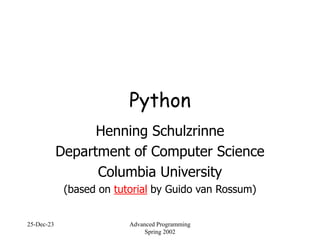
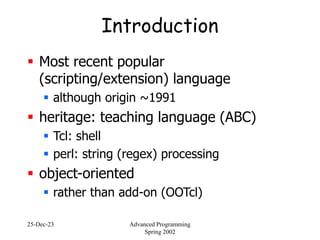
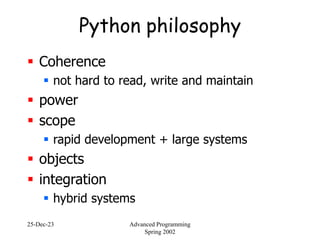
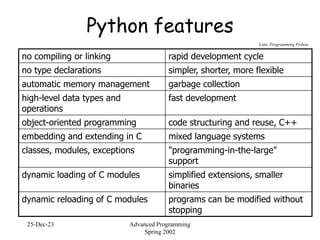
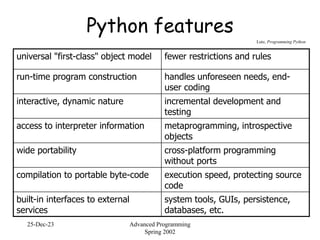
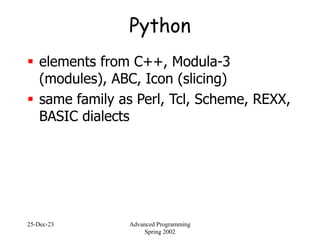
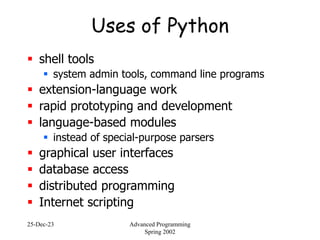

![25-Dec-23 Advanced Programming
Spring 2002
Using python
/usr/local/bin/python
#! /usr/bin/env python
interactive use
Python 1.6 (#1, Sep 24 2000, 20:40:45) [GCC 2.95.1 19990816 (release)] on sunos5
Copyright (c) 1995-2000 Corporation for National Research Initiatives.
All Rights Reserved.
Copyright (c) 1991-1995 Stichting Mathematisch Centrum, Amsterdam.
All Rights Reserved.
>>>
python –c command [arg] ...
python –i script
read script first, then interactive](https://image.slidesharecdn.com/python-231225115526-fd652832/85/python-ppt-python-python-python-python-python-9-320.jpg)
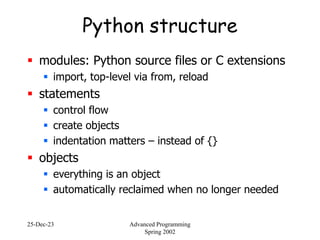
![25-Dec-23 Advanced Programming
Spring 2002
First example
#!/usr/local/bin/python
# import systems module
import sys
marker = '::::::'
for name in sys.argv[1:]:
input = open(name, 'r')
print marker + name
print input.read()](https://image.slidesharecdn.com/python-231225115526-fd652832/85/python-ppt-python-python-python-python-python-11-320.jpg)

![25-Dec-23 Advanced Programming
Spring 2002
String operations
concatenate with + or neighbors
word = 'Help' + x
word = 'Help' 'a'
subscripting of strings
'Hello'[2] 'l'
slice: 'Hello'[1:2] 'el'
word[-1] last character
len(word) 5
immutable: cannot assign to subscript](https://image.slidesharecdn.com/python-231225115526-fd652832/85/python-ppt-python-python-python-python-python-13-320.jpg)
![25-Dec-23 Advanced Programming
Spring 2002
Lists
lists can be heterogeneous
a = ['spam', 'eggs', 100, 1234, 2*2]
Lists can be indexed and sliced:
a[0] spam
a[:2] ['spam', 'eggs']
Lists can be manipulated
a[2] = a[2] + 23
a[0:2] = [1,12]
a[0:0] = []
len(a) 5](https://image.slidesharecdn.com/python-231225115526-fd652832/85/python-ppt-python-python-python-python-python-14-320.jpg)

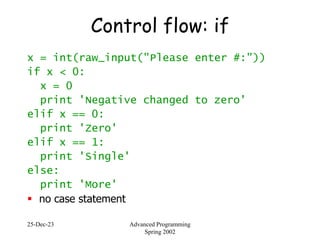
![25-Dec-23 Advanced Programming
Spring 2002
Control flow: for
a = ['cat', 'window', 'defenestrate']
for x in a:
print x, len(x)
no arithmetic progression, but
range(10) [0, 1, 2, 3, 4, 5, 6, 7, 8, 9]
for i in range(len(a)):
print i, a[i]
do not modify the sequence being iterated
over](https://image.slidesharecdn.com/python-231225115526-fd652832/85/python-ppt-python-python-python-python-python-17-320.jpg)
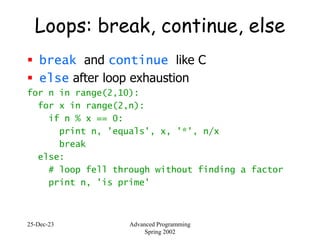
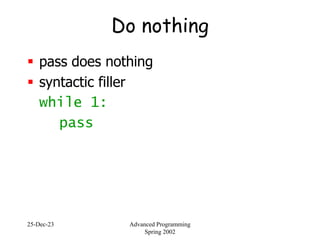
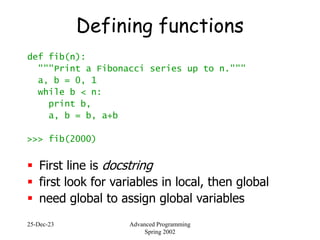
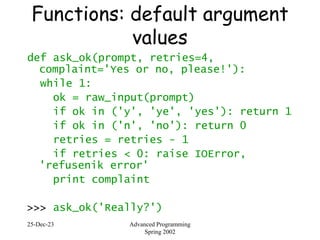
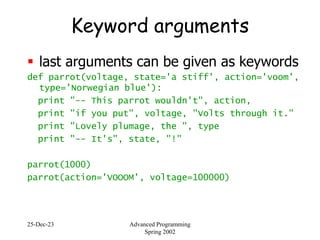
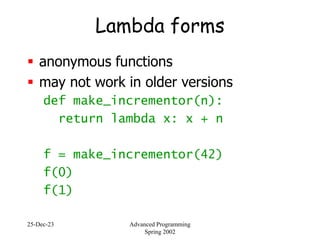
![25-Dec-23 Advanced Programming
Spring 2002
List methods
append(x)
extend(L)
append all items in list (like Tcl lappend)
insert(i,x)
remove(x)
pop([i]), pop()
create stack (FIFO), or queue (LIFO) pop(0)
index(x)
return the index for value x](https://image.slidesharecdn.com/python-231225115526-fd652832/85/python-ppt-python-python-python-python-python-24-320.jpg)
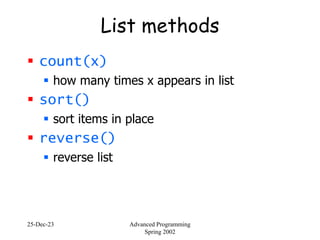
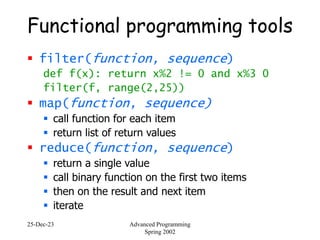
![25-Dec-23 Advanced Programming
Spring 2002
List comprehensions (2.0)
Create lists without map(),
filter(), lambda
= expression followed by for clause +
zero or more for or of clauses
>>> vec = [2,4,6]
>>> [3*x for x in vec]
[6, 12, 18]
>>> [{x: x**2} for x in vec}
[{2: 4}, {4: 16}, {6: 36}]](https://image.slidesharecdn.com/python-231225115526-fd652832/85/python-ppt-python-python-python-python-python-27-320.jpg)
![25-Dec-23 Advanced Programming
Spring 2002
List comprehensions
cross products:
>>> vec1 = [2,4,6]
>>> vec2 = [4,3,-9]
>>> [x*y for x in vec1 for y in vec2]
[8,6,-18, 16,12,-36, 24,18,-54]
>>> [x+y for x in vec1 and y in vec2]
[6,5,-7,8,7,-5,10,9,-3]
>>> [vec1[i]*vec2[i] for i in
range(len(vec1))]
[8,12,-54]](https://image.slidesharecdn.com/python-231225115526-fd652832/85/python-ppt-python-python-python-python-python-28-320.jpg)
![25-Dec-23 Advanced Programming
Spring 2002
List comprehensions
can also use if:
>>> [3*x for x in vec if x > 3]
[12, 18]
>>> [3*x for x in vec if x < 2]
[]](https://image.slidesharecdn.com/python-231225115526-fd652832/85/python-ppt-python-python-python-python-python-29-320.jpg)
![25-Dec-23 Advanced Programming
Spring 2002
del – removing list items
remove by index, not value
remove slices from list (rather than by
assigning an empty list)
>>> a = [-1,1,66.6,333,333,1234.5]
>>> del a[0]
>>> a
[1,66.6,333,333,1234.5]
>>> del a[2:4]
>>> a
[1,66.6,1234.5]](https://image.slidesharecdn.com/python-231225115526-fd652832/85/python-ppt-python-python-python-python-python-30-320.jpg)
![25-Dec-23 Advanced Programming
Spring 2002
Tuples and sequences
lists, strings, tuples: examples of
sequence type
tuple = values separated by commas
>>> t = 123, 543, 'bar'
>>> t[0]
123
>>> t
(123, 543, 'bar')](https://image.slidesharecdn.com/python-231225115526-fd652832/85/python-ppt-python-python-python-python-python-31-320.jpg)
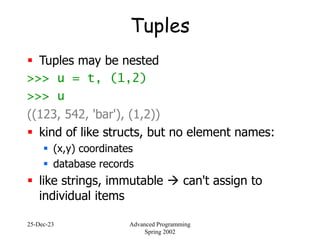
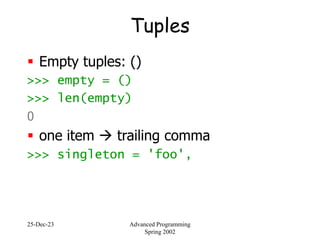
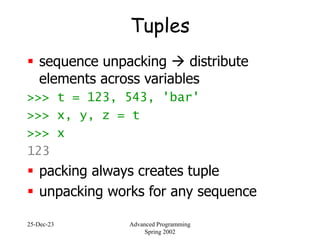
![25-Dec-23 Advanced Programming
Spring 2002
Dictionaries
like Tcl or awk associative arrays
indexed by keys
keys are any immutable type: e.g., tuples
but not lists (mutable!)
uses 'key: value' notation
>>> tel = {'hgs' : 7042, 'lennox': 7018}
>>> tel['cs'] = 7000
>>> tel](https://image.slidesharecdn.com/python-231225115526-fd652832/85/python-ppt-python-python-python-python-python-35-320.jpg)
![25-Dec-23 Advanced Programming
Spring 2002
Dictionaries
no particular order
delete elements with del
>>> del tel['foo']
keys() method unsorted list of keys
>>> tel.keys()
['cs', 'lennox', 'hgs']
use has_key() to check for existence
>>> tel.has_key('foo')
0](https://image.slidesharecdn.com/python-231225115526-fd652832/85/python-ppt-python-python-python-python-python-36-320.jpg)
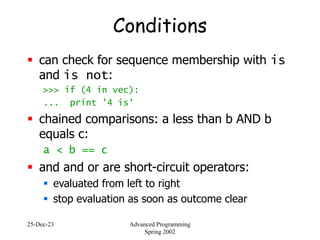
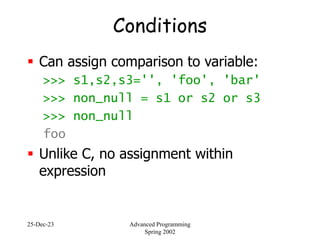
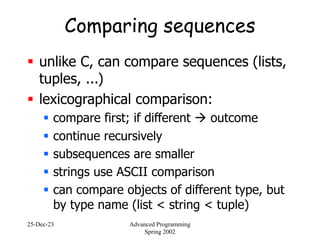
![25-Dec-23 Advanced Programming
Spring 2002
Comparing sequences
(1,2,3) < (1,2,4)
[1,2,3] < [1,2,4]
'ABC' < 'C' < 'Pascal' < 'Python'
(1,2,3) == (1.0,2.0,3.0)
(1,2) < (1,2,-1)](https://image.slidesharecdn.com/python-231225115526-fd652832/85/python-ppt-python-python-python-python-python-40-320.jpg)
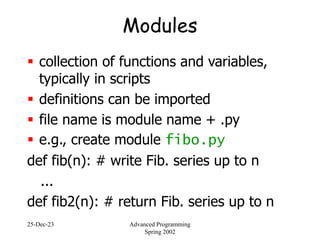
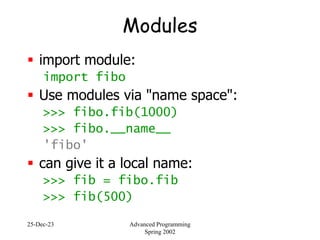
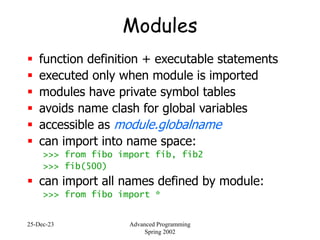
![25-Dec-23 Advanced Programming
Spring 2002
Module search path
current directory
list of directories specified in PYTHONPATH
environment variable
uses installation-default if not defined, e.g.,
.:/usr/local/lib/python
uses sys.path
>>> import sys
>>> sys.path
['', 'C:PROGRA~1Python2.2', 'C:Program
FilesPython2.2DLLs', 'C:Program
FilesPython2.2lib', 'C:Program
FilesPython2.2liblib-tk', 'C:Program
FilesPython2.2', 'C:Program FilesPython2.2libsite-
packages']](https://image.slidesharecdn.com/python-231225115526-fd652832/85/python-ppt-python-python-python-python-python-44-320.jpg)
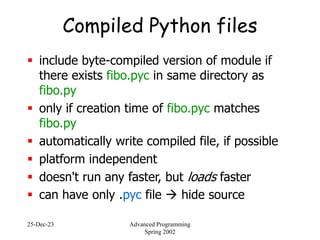
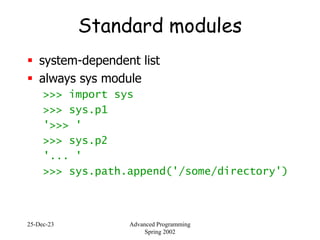
![25-Dec-23 Advanced Programming
Spring 2002
Module listing
use dir() for each module
>>> dir(fibo)
['___name___', 'fib', 'fib2']
>>> dir(sys)
['__displayhook__', '__doc__', '__excepthook__', '__name__', '__stderr__', '__st
din__', '__stdout__', '_getframe', 'argv', 'builtin_module_names', 'byteorder',
'copyright', 'displayhook', 'dllhandle', 'exc_info', 'exc_type', 'excepthook', '
exec_prefix', 'executable', 'exit', 'getdefaultencoding', 'getrecursionlimit', '
getrefcount', 'hexversion', 'last_type', 'last_value', 'maxint', 'maxunicode', '
modules', 'path', 'platform', 'prefix', 'ps1', 'ps2', 'setcheckinterval', 'setpr
ofile', 'setrecursionlimit', 'settrace', 'stderr', 'stdin', 'stdout', 'version',
'version_info', 'warnoptions', 'winver']](https://image.slidesharecdn.com/python-231225115526-fd652832/85/python-ppt-python-python-python-python-python-47-320.jpg)
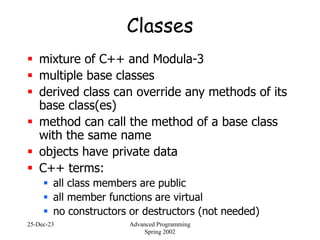
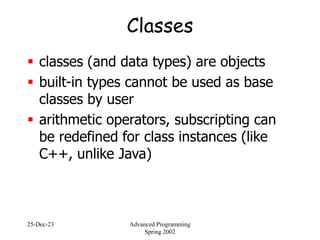
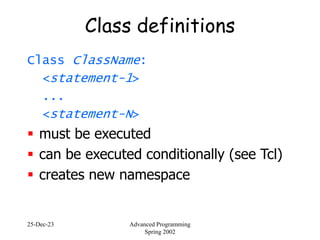
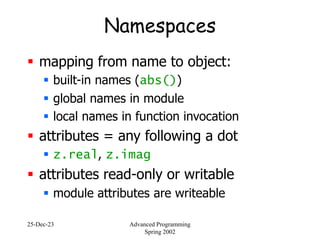
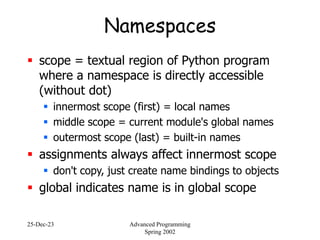
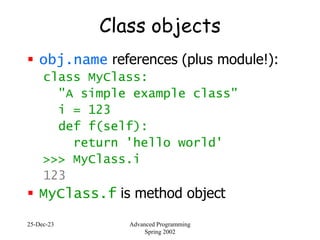
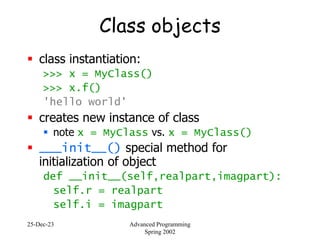
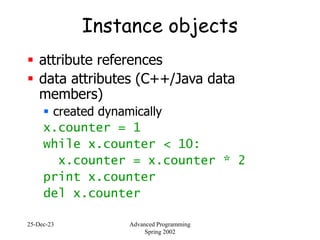
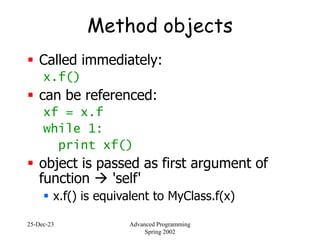
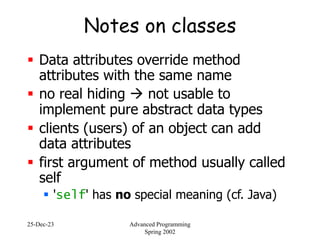
![25-Dec-23 Advanced Programming
Spring 2002
Another example
bag.py
class Bag:
def __init__(self):
self.data = []
def add(self, x):
self.data.append(x)
def addtwice(self,x):
self.add(x)
self.add(x)](https://image.slidesharecdn.com/python-231225115526-fd652832/85/python-ppt-python-python-python-python-python-58-320.jpg)
![25-Dec-23 Advanced Programming
Spring 2002
Another example, cont'd.
invoke:
>>> from bag import *
>>> l = Bag()
>>> l.add('first')
>>> l.add('second')
>>> l.data
['first', 'second']](https://image.slidesharecdn.com/python-231225115526-fd652832/85/python-ppt-python-python-python-python-python-59-320.jpg)
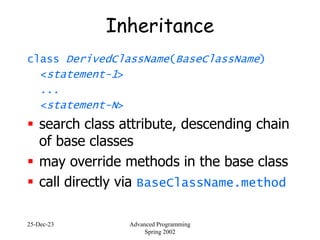
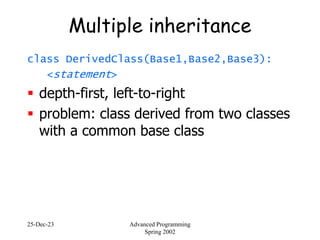
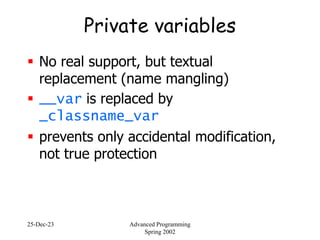
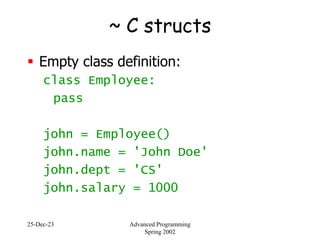

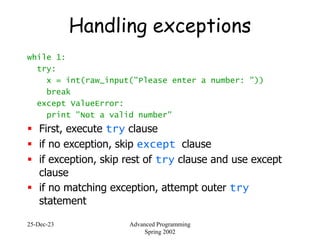
![25-Dec-23 Advanced Programming
Spring 2002
Handling exceptions
try.py
import sys
for arg in sys.argv[1:]:
try:
f = open(arg, 'r')
except IOError:
print 'cannot open', arg
else:
print arg, 'lines:', len(f.readlines())
f.close
e.g., as python try.py *.py](https://image.slidesharecdn.com/python-231225115526-fd652832/85/python-ppt-python-python-python-python-python-66-320.jpg)
